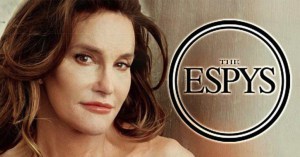Sarahbeth Caplin's Blog, page 45
August 2, 2015
I’m pro-life and I don’t support defunding Planned Parenthood
 Far from the first time, Rachel Held Evans has described my thoughts in a much more articulate way than I could think of myself (bold emphasis mine):
Far from the first time, Rachel Held Evans has described my thoughts in a much more articulate way than I could think of myself (bold emphasis mine):
Anyone else caught in this tension? I’m pro-life in the sense that I believe life begins in the womb and is worth protecting even before birth. However, 9 times out of 10, I find myself totally disagreeing with the pro-life movement’s methods for protecting that life.
For example, completely defunding Planned Parenthood with no plan to replace its other services (like offering affordable contraception, gynecological services, and prenatal care to underprivileged women), could actually lead to more abortions. Teaching abstinence-only education in public schools appears to be less effective than comprehensive sex-education at reducing the teen pregnancy rate. Simply voting for Republicans who want to make abortion illegal (even though they are very unlikely to do so and even though criminalizing abortion won’t stop it from happening) without considering how other conservative social policies affect women most at risk for having abortions seems like an exercise in futility. And opposing coverage for contraception in insurance policies seems like a great way to increase rather than decrease unwanted pregnancies.
It’s just so frustrating to agree with the pro-life movement’s ideals but virtually none of their methods, and to disagree with many of the pro-choice movement’s ideals and yet support many of their efforts to care for women in ways that are likely to decrease the abortion rate. It’s a classic stuck-in-the-middle dilemma and I’ve got no easy answers. Mostly I just find myself shouting at the TV screen no matter who is on to speak!
Look, I don’t agree with Planned Parenthood’s general ethic about sex: I don’t necessarily believe that “anything goes” so long as it’s between consenting adults using protection. I believe that the ideal placement of sex is between married couples. I believe sex is far more than a recreational act. But there is also more to Planned Parenthood than being an “abortion factory,” which it wouldn’t be, if there were less demand for abortions. I don’t know all the facts about other scandals PP has been accused of. But I do know that completely defunding an organization that does so much for women with very limited options in managing their health is a bad, bad idea.
I would love to see a world without abortion. I’m sure most pro-choice people feel the same way. I just don’t think defunding PP is the best way to make that happen. If that means I have to forfeit my salvation, so be it.
Filed under: Feminism, Religion Tagged: Abortion, Christian culture, Christianity, Controversy, evangelicals, Feminism








July 31, 2015
Cancer patients as heroes
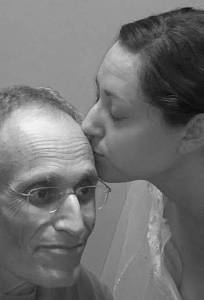 Writing a letter to the editor of my hometown newspaper about the many faces of bravery got me thinking. For many people, cancer patients are likened to soldiers facing a battle, not knowing the outcome. I spent many summers of my childhood walking in Relay for Life marathons for cancer fundraising, during which cancer survivors were given survivor medals. Dad’s medal is still hanging in his former home office. Seeing it used to give me hope, but now there’s something about it that bothers me.
Writing a letter to the editor of my hometown newspaper about the many faces of bravery got me thinking. For many people, cancer patients are likened to soldiers facing a battle, not knowing the outcome. I spent many summers of my childhood walking in Relay for Life marathons for cancer fundraising, during which cancer survivors were given survivor medals. Dad’s medal is still hanging in his former home office. Seeing it used to give me hope, but now there’s something about it that bothers me.
The people who lost the “battle” aren’t getting any medals. And it should go without saying that the biggest difference between a solider fighting for his country and a person fighting a disease is that a soldier chooses to enlist in battle. Cancer patients don’t get the luxury of choice.
What are we really saying when we call cancer patients “brave”? The reality is, no matter how you handle your diagnosis, you must show up for treatment if you don’t want to die. You can kick and scream your whole way there, but that doesn’t make you less brave than someone who shows up calmly. You could have an absolutely crappy attitude about life being unfair, but I think cancer patients have earned the right to be a little negative. While science has shown that a positive attitude can influence a person’s health, it’s far from being a cure. If that were true, my father would still be alive – he was the most optimistic person I’ve ever known.
It wasn’t the cancer that made my father brave. Choosing optimism in the face of any negative circumstances is a brave choice, I think. Choosing to see the good in people no matter what is a brave choice. Reaching out to people with a helping hand and open heart, despite the risk of rejection, is brave. Speaking your mind without fear of judgment is brave. Even choosing fatherhood was brave – perhaps the bravest decision he ever made. Just being my father made him my hero. My dad was brave before cancer, and he would have been brave if he never had cancer.
Only at the very end of his life did he talk about some of the pressure he felt to live, as if dying would let people down. As if anyone would blame him for “giving up”! As if dying = no longer brave, no longer a hero.
While having an illness can strengthen a person in many ways, I do think that we need to be careful about idolizing cancer patients. The hospice nurses encouraged my family to give Dad “permission” to let go when it was time. I know that saying “You’re gonna beat this” is said with good intentions, but sometimes the people we love need to hear that it’s okay if they don’t. How a person lives matters more than how they die. We don’t get a say in how we meet death, but how we live says more about our strength than anything.
Filed under: Other stuff Tagged: cancer, grief








July 29, 2015
Bitterness: the new religious B-word
“Why are Jews still bitter about the Holocaust? It was over half a century ago; it’s time to move on.”
“You’d have a much better relationship with God if you got over your bitterness and forgave people already.”
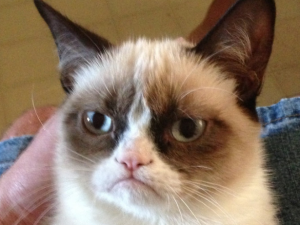 Bitterness: a much-feared word in Christian and Jewish circles. This word is used when a consensus is reached that no one should be angry anymore, but if one still has degrees of trauma, bouts of anger, PTSD, or anxiety, it’s clearly a spiritual issue. Worse, it’s a stubborn refusal to grow.
Bitterness: a much-feared word in Christian and Jewish circles. This word is used when a consensus is reached that no one should be angry anymore, but if one still has degrees of trauma, bouts of anger, PTSD, or anxiety, it’s clearly a spiritual issue. Worse, it’s a stubborn refusal to grow.
In my experience, “bitterness” is something that takes root in one’s heart when their feelings are patted down with platitudes: “Just pray harder, you’ll feel better.” Bitterness takes root in my heart when my feelings are not being taken seriously.
Need I say that this is incredibly invalidating? This process is called gaslighting, and though it’s not a uniquely fundamentalist problem, it is obscenely prevalent in fundamentalist Christian circles. But I don’t think Christians do this because they don’t care about people who are hurt; I think they do this because many are not well equipped to deal with anger in a healthy way.
I can’t help but think of Jesus furiously tipping those tables on which people exchanged money in the temple, and I can’t help but think, Now that is a Jewish response! That is how you deal with chutzpah! But who would accuse Jesus of being “bitter”? When moral codes were being violated, when underdogs were being mistreated, anger prompted Jesus to act accordingly. But try suggesting in bible study that flipping tables is an appropriate response to the question What Would Jesus Do? and see what happens.
There must be more than one way to “flip a table,” so to speak. Anger by itself is not good or bad. Harvested properly, it could even be a good thing – but how many of us know how to do that?
If I ever figure that one out, I’ll write my next book about it. For right now, the best I can offer is what doesn’t work:
Responding to accusations with accusations. “You’re being bitter”; “Well, you’re just stupid.” Calling someone “stupid” is obviously unproductive, but substituting “ignorant” isn’t very effective, either. That’s another conversation-stopping word that basically says, “You’re telling me I don’t know anything.” The last time I heard someone say Jews are bitter for not “getting over” the Holocaust, as if it were the same inconvenience as a downpour at a picnic, I wish I had said, “Yes, Jews are still bitter, because there is still genocide happening in the world, and there are still people choosing to look the other way. That does make me bitter. It should make everyone bitter.” The accusing person is not being put down, but is hopefully challenged to rethink their approach (obviously, “bitter” is too tame a word to describe completely justified fury over genocide, but if that’s the word being used, I say just work with it).
Revealing the story beneath the label. I am a Christian who is frequently tired of other Christians. I’m worn out when I am asked about the most effective ways to convert Jews, since I have an insider’s perspective. Most of all, I’m exhausted at having to explain the connection between my rape and my feminist identity. It was the rape, the humiliation, and excuses I accepted that made me realize how desperately the world needs this cause. I’m tired of having to explain that I am not a feminist because I want to usurp men, or otherwise don’t value them.
But, I have built bridges with Christians by explaining some of my abusive history – just enough to get my point across, since much of it is intensely personal. This approach yields greater understanding, even if we still end up agreeing to disagree, than flatly spitting, “Quit yapping about something you clearly know nothing about.”
Accepting when someone is simply not ready to talk. It does come across as bitter by forcing a conversation that’s not meant to be had at a particular moment. I have never heard of a successful conversion story, be it to a religion or some other ideology, which involved forcing a viewpoint down someone’s throat, ignoring clear signals that this is not the time. There may not ever be a right time. Save your energy for people who are truly invested in learning. Those are the ones will become your allies.
These suggestions aside, I still have unhealthy bitterness in my heart. I pray not to get rid of it, necessarily, but to mold it into something productive. Some of history’s most successful revolutions grew from bitter unrest about the way things are. Choking down artificial happiness only masks a problem, resulting in – surprise! – harder-to-penetrate bitterness that will inevitably destroy anything it touches. Bottom line: being fake has rarely solved anything, but authenticity has been proven to go a long way.
Filed under: Feminism, Rape Culture, Religion Tagged: censorship, Christian culture, Christianity, Controversy, depression, evangelicals, Feminism, Judaism, rape culture, social justice








July 27, 2015
Cancer patients and Caitlyn Jenner: why can’t both be brave?
The following is a letter to the editor in response to an article that specifically names my father as a braver individual than Caitlyn Jenner:
I’m David Caplin’s daughter, and as flattering as it is for you to acknowledge him by name as a man of courage, you are wrong that men like my father are braver than Caitlyn Jenner, and even more wrong to assume that his suffering was worse than anything a transgendered individual might face in his/her lifetime.
There is no shortage of sympathy for cancer patients – it’s a disease that no one wants. It’s a disease that does not choose its victims based on gender alone.
Here are some examples of what transgendered people face, from The Huffington Post:
An 8-year-old boy was beaten to death by his father
A 14-year-old was strangled to death and stuffed under a bed
Two 16-year-olds were shot to death
Three 18-year-olds were stabbed to death, dismembered or shot
Two 18-year-olds were murdered with no details being reported
An 18-year-old suffered two violent attacks by a mob and survived
Among the 102-person figure that comes in from 14 countries worldwide, “36 persons were shot multiple times, 14 stabbed multiple times, 11 were beaten to death, three were burned to death, three dismembered/mutilated, and two were tortured, two were strangled, one was hanged, one had her throat cut and one was stoned to death.”
That a privileged celebrity like Caitlyn Jenner would use her platform to help this extremely marginalized demographic, fully aware of the bigotry she would receive, is pretty damn brave in my book.
Mr. Aceto, there is no single copyrighted definition of “brave.” Bravery comes in all forms, in all kinds of people, in many diverse situations. My father was one of the bravest people I knew, but he is far from the only one. Knowing the kind, compassionate soul he was, I think he’d be honored to share that character trait with the likes of Caitlyn Jenner.
Sincerely,
Beth Caplin Stoneburner
Filed under: Other stuff, Writing & Publishing Tagged: Caitlyn Jenner, cancer, Controversy, LGBT, Transgendered








The impossible lesson of empathy
 The expression “Hurt people hurt people” could have been written about my life. One of the reasons I know I still need Jesus is because there are times during intense grief when it feels good to bring others down with me. I’m not proud of this. I make no attempts to justify it. I’m just admitting that I do it.
The expression “Hurt people hurt people” could have been written about my life. One of the reasons I know I still need Jesus is because there are times during intense grief when it feels good to bring others down with me. I’m not proud of this. I make no attempts to justify it. I’m just admitting that I do it.
I lost two friends over fights I picked recently. The first was when an acquaintance told me that God protected his home during a storm. Other people on his street experienced varying degrees of property damage, but not this guy. If I wanted to respond tactfully, I could have suggested it was more likely that, in nature’s random, non-agenda-driven way, the storm just didn’t travel a path in which his house was a target. But that wasn’t a remote possibility for him: God protected his home. I told him, without trying to hide my spite at all, “Isn’t it funny that the people who believe in the prosperity gospel are the ones who benefit from it?”
The other instance was a friend who bragged that God provided her a new house: not a realtor, not the buyer of the home she was trying to sell. I had to ask why God provided her – someone with no shortage of monetary means – with a home, but not, say, an actual homeless person.
That’s the thing about these “providence” stories. When I hear them, I’m not going to feel encouraged and inspired, as the story teller wants me to feel. Instead I’m going to be wondering about all the other people in need of blessings and miracles; people who live on the streets and subsist only on the kindness of strangers. People who lost pieces of property in a storm that they can’t afford to replace. But the ultimate question of all is, rather than protect select people in these storms, why doesn’t God just prevent them from happening in the first place?
“God’s ways are just higher than ours” isn’t a satisfactory response anymore. I can’t take it seriously from people who claim to benefit from those “mysterious ways” while the rest of us are left floundering for things we still need. It doesn’t matter to me anymore that people generally mean well when they say these things. I only hear the unspoken implication that they are favored in ways that other people are not. I’ve heard stories of how God healed people with conditions just like my father’s because they prayed hard enough, which strongly implies that people like my dad didn’t have enough value to be worth saving. I don’t believe that, but that’s what I hear.
That’s why I bristle when I hear these stories, which I’ve heard in just about every church group I’ve been to over the last few years. That’s why I can’t help but think to myself, you are not a safe person for me to share my story with whenever I hear one. Maybe that’s unfair, but it’s an emotional risk I just can’t afford to take.
I received an email from a family acquaintance two weeks before Dad died, asking if he had accepted Jesus as his savior so he could go to heaven: the unmentioned implication being, of course, that no Jesus meant no peace after death, but only more suffering. That email pushed me into one of the worst anxiety attacks I’ve ever had. In my mind, the people who think nothing of asking a stranger if a sick relative has been saved are the same kind of people who don’t understand what’s so hurtful about these “miracle” stories. They are the same people who might not understand why I don’t find the platitudes comforting, and might even find it offensive that “Because God said so” isn’t enough for me. Not if I can’t understand why.
That’s an unfair generalization to make about people who just want to be helpful, but grief isn’t known for being rational and reasonable. It’s not a permanent excuse to get off the hook for lashing out, but sometimes the walls it builds can be helpful. At this still-fragile point when it hasn’t been a full year since I lost my father, those walls keep me from revealing too much to people who aren’t ready to hear or understand.
But one benefit of letting down those walls is allowing the grief to thaw one’s heart enough to understand that people who say those hurtful things likely haven’t experienced the same hurts in life, and if they have, they might come to different spiritual conclusions about them. If they truly believe that God protected them in a plane crash that killed everyone else on board, is it right to try and take that hope from them? Is it cruel to judge it and tear it to pieces?
Judaism taught me that no one is immune to suffering; that there is often no conceivable reason for it, and to give credit where it is due: to doctors, rescue teams, people in public service. Christianity is teaching me empathy for those who are lucky enough to have never suffered too deeply, and for those who process pain differently than I do. It’s a one-step-forward-two-steps-back kind of lesson, but I give myself points for at least acknowledging that I need to learn it. And admitting you have a problem is the first step toward correcting it, so I’ve heard.
Filed under: Religion Tagged: cancer, Christian culture, Christianity, Controversy, depression, evangelicals, First World Problems, grief, Judaism








July 26, 2015
The secret benefit of “spiritual disconnect”?
Every now and then I get this compulsion to go back and reread some old journals – maybe in hope of finding proof that I am, in fact, maturing properly, even if it doesn’t always feel that way.
This entry was written exactly a year to the day my father died: September 25, 2013.
I know why God felt distant then: I just left seminary, feeling like I wasn’t “Christian enough” (after being labeled a Christian extremist in college the year before). The “justice” I’m referring to is regarding my ex-boyfriend, whom I was either brave enough or foolish enough to send a letter “officially” calling him out for what he did, which I didn’t have the courage to do as he was breaking up with me. I was deeply concerned he would do the same thing to his current girlfriend, and I regretted not ever reporting him, even if by then the statute of limitations had long since run out.
Heavy stuff for anyone to deal with, at any age or place in life. But it goes to show the difference a year can make: if I had to choose between justice for myself and getting my Dad back, obviously the latter is more important. I lost someone who mattered – someone actually worth grieving over. If I thought life was hard the year before…well, I had no idea what more was coming to me. I feel like I’ve been stretched quite a bit, and I could sure use a break. Not a stress-free life, just…well, maybe a slightly more boring one. Except I am a permanent resident in SarahbethLand whether I like or not, and I know better than to expect less than perfect chaos.
Still, to say there isn’t any grief in losing an abusive partner would be a lie. I lost five years of time I could have spent seeing other people, and I turned down a few guys who showed some potential because that guy was my priority. And he was – perhaps still is – the kind of guy who could make anyone say “He’d never do that” with absolute conviction.
This journal entry brings up a few questions. Is justice really God’s alone, or can humans make it happen, too? And are the times when God “pulls away” from us (or so it feels) really the times that teach and enrich us the most? Because if so, I must be in for a major spiritual awakening.
Filed under: Rape Culture, Religion Tagged: cancer, Christian culture, Christianity, depression, grief, rape culture








July 24, 2015
How growing up and getting married changed my views on abortion
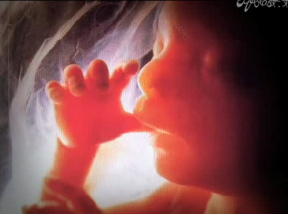 I pissed off a great number of people in college with some of my opinion columns on abortion. It’s critical to note that at the time they were written, I had never had a pregnancy scare, and I was adamantly against the pill: my understanding of how it worked wasn’t entirely accurate.
I pissed off a great number of people in college with some of my opinion columns on abortion. It’s critical to note that at the time they were written, I had never had a pregnancy scare, and I was adamantly against the pill: my understanding of how it worked wasn’t entirely accurate.
Today, I’ve experienced both of those things, and my viewpoints have been changed considerably, even though I still consider myself pro-life. The leaked video of Deborah Nucatola discussing the pricing of fetal body parts got me thinking again – but this post isn’t about the details of that video, which I haven’t watched.
There’s two kinds of pro-lifers, I think. There are the ones who only want to outlaw abortion but do nothing to help prevent the circumstances leading women to choose it (and they probably abhor the idea of women choosing and enjoying sex in the first place). And then there are the ones who want to see a reformed society: one that educates its children, encourages healthy relationships, takes care of its poor, and places compassion above judgment. I’d like to think I’m the latter kind of pro-lifer – I hesitate to call the former pro-life at all.
There are so few people I can discuss this with openly and without argument. Many of my Christian friends will stop at “It’s murder!” and find the circumstances in which a woman chooses abortion to be irrelevant. Doesn’t matter if she’s poor and can’t feed another child. Doesn’t matter if her child has been diagnosed in utero with a disease that will surely make his life painfully short. In many cases, abortion is an act of desperation, not a celebrated decision, and compassion for the circumstances is completely absent.
On the flip side, I have extremely liberal friends who will fight to the death (no pun intended) to defend abortion as a constitutional right. It’s the woman’s choice only that matters – the father’s opinion isn’t relevant. The woman’s family’s opinion isn’t relevant. It’s her decision, and her decision alone.
Honestly, I think both sides get things backwards. There are some questions I’ve been afraid to ask, at the risk of starting an argument and coming across as anti-feminist, but nonetheless, they bug me: Why is the father’s opinion of the fate of the pregnancy not important? Assuming the sex was consensual, and even better – assuming the couple has a committed relationship, why can’t this be a decision they work out together (obviously if the pregnancy was caused through rape, the “father” is no father at all, but rather a sperm donor). The woman didn’t get pregnant all by herself. And, most controversially, I also have to ask why abortion is considered a constitutional right? I do not understand the denial, even outrage, that the biological purpose of sex is to make babies. That’s an evolutionary fact, not just a religious idea.
I ask these questions not to shame or judge anyone. As a now-married and sexually active woman, I finally have a concern in this debate when I didn’t before. And as a married woman on the fence about having children, I think I’d be in for a major attitude adjustment if I did get unintentionally pregnant, but hopefully (knocks on wood) my taking a pill every day will prevent that from becoming a reality before we’re ready. I feel sad that women get unintentionally pregnant because they were denied access to birth control for financial or other reasons. It scares me to think there are teenagers out there who never learned how sex actually works, and buy into myths that pulling out is foolproof or that you can’t get pregnant the first time. I’m upset that some women choose abortion because the programs designed to help low-income families have been shut down by greedy politicians, and they can barely afford the children they already have.
I’m much more interested in working together with pro-choice and pro-life people alike to prevent abortion from becoming an option in the first place. I was wrong to think that making abortion illegal would magically stop unintended pregnancies from happening and motivate people to make more responsible choices with their sexuality. I was wrong to think policing people’s sex lives would result in a better world.
I’m tired of the black and white thinking on both sides of the issue. The grey middle isn’t any easier, though. The moment I admit that I don’t think outlawing abortion will solve anything, but actually worsen the situation with more back-alley procedures, has earned me a scarlet H for heresy on the extreme pro-life side, and merely asking about the fairness of women making all the decisions themselves has branded me an anti-feminist on the pro-choice side, which couldn’t be further from the truth. But if both sides envision a world with less abortion, honest communication accomplishes far more than marching with picket signs and shaming women whose stories you don’t know. That’s the only thing I’m certain about, other than that a baby should ideally not have to suffer the consequences of a society that isn’t always fair to its women.
Filed under: Feminism, Other stuff, Rape Culture, Religion Tagged: Abortion, Christian culture, Christianity, Controversy, marriage








July 22, 2015
“Go Set a Watchman” shows how little has changed in 50 years
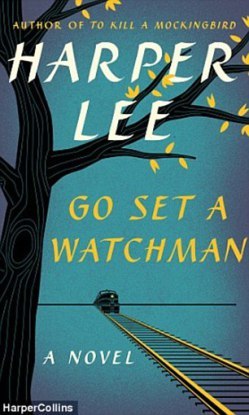 Go Set a Watchman was an insightful but disappointing read – disappointing because I, like many Mockingbird fans, saw Atticus Finch as an iconic figure and a kind of hero. Watchman definitely tears that image to bits.
Go Set a Watchman was an insightful but disappointing read – disappointing because I, like many Mockingbird fans, saw Atticus Finch as an iconic figure and a kind of hero. Watchman definitely tears that image to bits.
But it’s a timely book, because “separate but equal” is a recurring theme in this country’s history: from race, class, and now with the legalization of gay marriage.
Watchman shows that prejudice and equality are complex and often go together: you can support equal rights legally and still believe one group of people is superior to another. There’s overt prejudice, and then there’s prejudice doused with pleasantness – the latter being the hardest to diagnose. Somehow, as prevalent as racism is, it’s not always “polite” to wear it so obviously on one’s sleeve (unless you belong to the Klan).
But this book makes me wonder if “polite” prejudice is perhaps the most harmful kind. That’s what we saw in Mockingbird, told from the child perspective of Scout Finch. In Watchman, the racism is obvious and unapologetic, and the now-grown Jean Louise Finch comes to the same realization that Mockingbird’s readers knew all along: she was duped by her childhood. She learns that good is not always good; that justice and equality do not always go hand in hand.
I confess that I have not witnessed a great deal of racism personally. My sheltered, privileged upbringing kept me sheltered from that. I didn’t have any black friends growing up; my high school barely had any non-white students. But I have gone to church with people who tout the line “Hate the sin, not the sinner” regarding LGBT people. The more I talk to my gay friends, and the more I learn about homosexuality as an intricate part of someone’s given sexuality, the more I realize how much “separate but equal” feelings permeated my previous church groups and bible studies. In many ways, the anti-gay sentiments doused in “love” are a lot like veiled racism: laced within social niceties are condescending, “I know better than you” attitudes that don’t just offend, but belittle the recipient, giving them the impression that they deserve kindness because there is something wrong with them; something they cannot see or fix on their own. Because they are sick, stupid, or in denial.
Such is the attitude towards black people within the Finch family: they are an infant group struggling to grow up fast so they can sit at the White Big Kid table. And like infants learning to walk, they clearly need a hand from the white people, who know better. But this is talked about with such good intentions, so the Finches – most heartbreakingly, Atticus Finch – aren’t the bad guys. In fact, Atticus is one of the “nice racists” because even though he sees blacks as inferior, he still wants to help them, and gets frustrated when that help is refused, because like toddlers, they don’t want to learn.
At least the people wearing the white hoods, waving the Confederate flags, and holding up signs make it clear where they stand. I actually prefer that kind of prejudice – there’s no bullshit, just raw honesty.
As far as literature goes, Watchman suffers from a lack of continuity with its plot: mainly, I couldn’t figure out what the plot was supposed to be, exactly. It’s a book driven by characters and dialogue more than anything else, and the shifts between first and third person with Jean Louise were distracting. If nothing else, Watchman shows how very little has changed within the last fifty years. People like Atticus Finch were the “good guys” of his time, and in 2015, it seems they still are.
Filed under: Other stuff, Religion, Writing & Publishing Tagged: banned books, censorship, Christian culture, Christianity, Controversy, evangelicals, gay marriage, Go Set a Watchman, Harper Lee, LGBT, Racism








July 17, 2015
Never judge a believer by her jewelry
I spent many years believing that being Jewish was an accident of birth: a decision made for me by nature that I had no say in. But because I did not choose it, it’s a fixture in my life that just is: it follows me wherever I go. Unlike Christianity, it’s an aspect of identity that I do not have to work to maintain. My lineage does not get a memo whenever my beliefs change.
After trying for years to merge my two faiths together, without success, I retired my cross and Star of David pendants. At one point, I wore them both on the same chain, but realized this was a rather in-your-face attempt at justifying myself to other people. While the opinions of others shouldn’t have a factor in determining the kind of person I want to be, I would hate to hinder any possibility of discussion because someone is offended at my flagrantly mixing the equivalent of ice cream and ketchup.
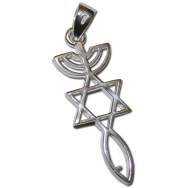 It’s also for this reason that I do not wear the Messianic Seal charm I purchased on my last trip to Israel. I still have it, but I know how I would have reacted to it back when I feared missionaries like the plague.
It’s also for this reason that I do not wear the Messianic Seal charm I purchased on my last trip to Israel. I still have it, but I know how I would have reacted to it back when I feared missionaries like the plague.
Is it necessary to wear my faith on a silver chain? No, of course not. But for me, a pendant of religious significance is a lot like wearing a purity ring. The ring itself doesn’t do anything, but it’s a reminder of what’s important to you, particularly when temptation knocks. Also, given my extreme introverted nature, wearing a religious symbol does the talking for me, lest anyone accuse me of not fulfilling my duty to carry out the Great Commission.
I was out shopping one day and happened upon an independent gift shop in Fort Collins, where I spotted a silver tree necklace that instantly made me think of roots – as in, family history roots. That said more about my faith’s current state than any existing religious symbol. True, the image of being “grafted in” a Jewish family tree is found in Christian Scripture, but for me, it’s in reverse: my roots are Jewish, but the leaves at the top – my beliefs – are my own.
Not long after that purchase, I wandered into another independent gift shop in my hometown of Hudson, Ohio. My discovery there was a real surprise: a tear-drop pendant with a six-pointed star etched into it, with the word “faith” printed underneath. This struck me as unusual because, let’s face it: in the world of jewelry, words like “faith,” “love,” or “hope” have unofficially been copyrighted by Christianity.
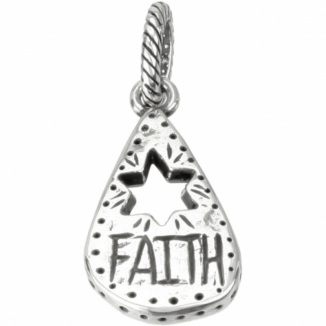 I can’t count the number of times in my teen years I’ve put down cute heartsy jewelry with imprints of crosses or Ichthus fish. It was hurtful, really, for these jewelry companies to assume that no other religion prioritized love or any other touchy-feely sentiment. But if I’m truly honest with myself, I know why this is: there is hardly a big enough market for Jewish jewelry with words like “faith” or “love” on them. Those items might be found in uniquely Judaic shops, yet I happened upon one of the few that found a home in a shop primarily frequented by mainline Protestants.
I can’t count the number of times in my teen years I’ve put down cute heartsy jewelry with imprints of crosses or Ichthus fish. It was hurtful, really, for these jewelry companies to assume that no other religion prioritized love or any other touchy-feely sentiment. But if I’m truly honest with myself, I know why this is: there is hardly a big enough market for Jewish jewelry with words like “faith” or “love” on them. Those items might be found in uniquely Judaic shops, yet I happened upon one of the few that found a home in a shop primarily frequented by mainline Protestants.
Impulsively, I bought that charm, if for no other reason than to remember it exists. At any rate, it’s a far more tasteful representation of my unique brand of faith than a Messianic Seal or, as I’ve seen elsewhere, a Star of David with a cross inside. But if I’ve learned anything over the years, part of not judging people by their outer appearance also means not making assumptions about their beliefs based on their jewelry.
As a naive teenager, I was the Certain One: certain of my true identity. Certain of God’s plan for my life. I hate having unanswerable questions and a perpetual identity crisis, but being a grownup sometimes means embracing the story we don’t want or expect. That we did not choose it does not make it any less ours.
Filed under: Religion Tagged: Christian culture, Christianity, Controversy, evangelicals, Judaism








July 12, 2015
“I straddle a line between two faiths”: a coming out story
I definitely thought I’d be the last candidate to be asked to share her off-beat testimony at a church small group, but somehow I was. The first two minutes won’t be surprising to anyone who has read Confessions of a Prodigal Daughter, but the last two minutes are a big step for me: you know you’ve found a good church if you can admit that sometimes you feel agnostic, and still be encouraged to speak.
Talking about where I am today, spiritually, was more important than rehashing the last 8 years of faith, because I’m not that same bright-eyed new believer anymore. Now I don’t hide what does and does not make sense, because authenticity matters more to me than winning people to my side with clever arguments.
I love that I can admit that I straddle a line between two faiths, am more confused than ever, and still be told I’m welcome.
Filed under: Religion, Writing & Publishing Tagged: Author Sarahbeth Caplin, censorship, Christian culture, Christianity, Confessions of a Prodigal Daughter, Controversy, evangelicals, Judaism, social justice, Writing









